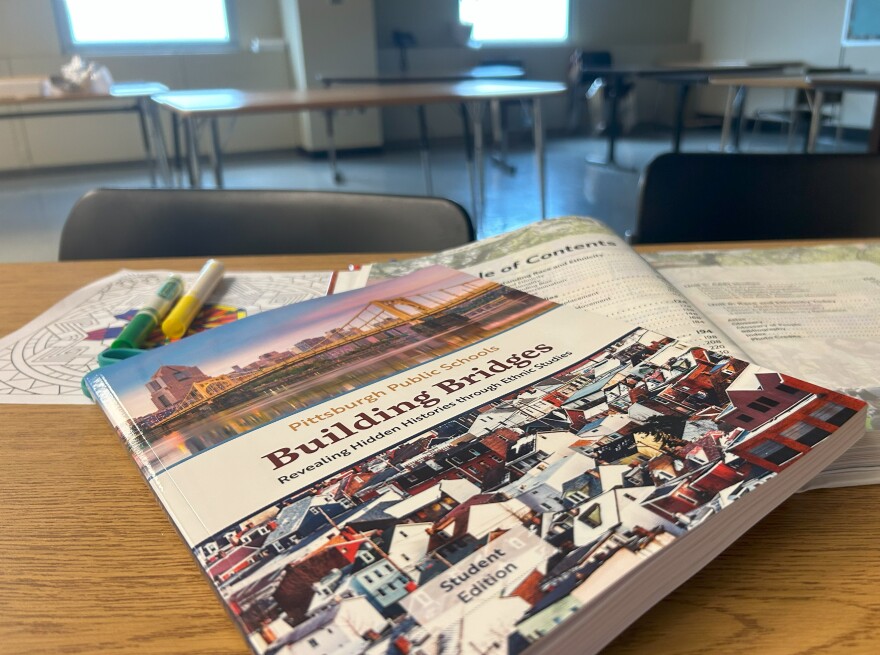Education
Pittsburgh High Schools Launch New Ethnic Studies Course for Seniors

The upcoming school year will see the introduction of a new ethnic studies course in Pittsburgh Public Schools, focusing on identity, culture, and power within the local community. This initiative aims to provide high school seniors with a comprehensive understanding of the diverse histories and identities that shape the region, using custom materials developed in partnership with the organization Education Elements.
Course materials will feature interviews with survivors of the Tree of Life Synagogue shooting, historical accounts of Pittsburgh’s Chinatown, and insights into the indigenous Lenape Nation of Pennsylvania. According to Christopher Taylor, the district’s K-12 social studies curriculum coordinator, the course emphasizes student empowerment and relevance. “Our hope is that the more meaning and the more agency that students have in their educational experience, the more that’s going to make them want to come to school,” Taylor stated.
Research has linked ethnic studies programs to increased student engagement, improved attendance, and higher graduation rates. These findings influenced Pittsburgh’s decision to look to successful models in California, which made ethnic studies a high school graduation requirement in 2021. Starting with the class of 2028, all Pittsburgh Public Schools (PPS) seniors will need to complete either an ethnic studies course or African American studies to graduate.
The introduction of this curriculum is part of a broader effort initiated in 2019, when PPS unveiled a racial equity plan aimed at improving educational outcomes for Black students, who represent over half of the district’s enrollment. Persistent disparities in test scores and discipline practices have drawn criticism toward the district, prompting long-standing complaints from parents and advocacy groups.
Kymberly Cruz, who oversees the district’s Office of Equity, has emphasized the importance of systematic improvements, stating that the district is required to submit a report on its progress to the Pennsylvania Human Relations Commission by the end of the month.
The course is designed to cover a wide range of histories typically overlooked in standard social studies classes, including African American, Asian American, Pacific Island, and Latino histories. Notably, there will be a focus on the local Jewish, Arab American, and Irish communities. Taylor noted the importance of teaching students about the evolving nature of identity and the similarities and differences among various cultural groups.
In addition to traditional coursework, students will engage in project-based learning activities. Janelle Price, who will teach the course at Allderdice High School, expressed enthusiasm for the curriculum’s interactive elements, which will include podcasting and online map-making. “It’s so teachable and so necessary for right now, for discovering who we are as Americans,” Price remarked. Each student will also complete a capstone project, identifying local leaders who can influence their chosen issues and presenting their findings at the year’s end.
Educators, such as Erica McDill-Sharkey from Westinghouse Academy, anticipate that the course will expand students’ cultural awareness. She highlighted that Pittsburgh, despite its numerous bridges, often sees residents staying within their own neighborhoods. “This will open their eyes to other cultures that maybe they haven’t even come in contact with thus far in their lives,” McDill-Sharkey noted.
The launch of the ethnic studies course arrives amidst a national conversation regarding diversity and inclusion in education. Under the previous administration, schools faced pressure to eliminate programs centered on race and identity. In February, the U.S. Department of Education warned institutions about the potential loss of federal funding for any programs perceived to use race-based preferences.
Following this, the department clarified that programs focused on cultural interests would not violate federal law, provided they are inclusive. The PPS ethnic studies course is open to all students and is mandatory for the graduating class of 2028, regardless of their racial or ethnic background.
While Pittsburgh has committed to advancing its ethnic studies program, other schools have begun to retract similar initiatives. California recently passed legislation requiring ethnic studies in high schools, but failed to provide funding for its implementation. Furthermore, the University of Pittsburgh announced it would dismantle its Office of Diversity, Equity, and Inclusion, replacing it with a new focus on Institutional Engagement and Well-being.
Despite these challenges, Price expressed pride in PPS for prioritizing ethnic studies amidst political pressures. “We have a mission that’s been very successful in leaving out politics, in that we are going to continue to teach the way we should — fairly — all the time,” she emphasized. McDill-Sharkey echoed this sentiment, asserting that education should remain a safe space for students to explore sensitive issues and express their views without outside interference.
-

 Technology5 months ago
Technology5 months agoDiscover the Top 10 Calorie Counting Apps of 2025
-

 Health2 months ago
Health2 months agoBella Hadid Shares Health Update After Treatment for Lyme Disease
-

 Health3 months ago
Health3 months agoErin Bates Shares Recovery Update Following Sepsis Complications
-

 Technology4 months ago
Technology4 months agoDiscover How to Reverse Image Search Using ChatGPT Effortlessly
-

 Technology1 month ago
Technology1 month agoDiscover 2025’s Top GPUs for Exceptional 4K Gaming Performance
-

 Technology2 months ago
Technology2 months agoElectric Moto Influencer Surronster Arrested in Tijuana
-

 Technology5 months ago
Technology5 months agoMeta Initiates $60B AI Data Center Expansion, Starting in Ohio
-

 Technology5 months ago
Technology5 months agoRecovering a Suspended TikTok Account: A Step-by-Step Guide
-

 Health4 months ago
Health4 months agoTested: Rab Firewall Mountain Jacket Survives Harsh Conditions
-

 Lifestyle5 months ago
Lifestyle5 months agoBelton Family Reunites After Daughter Survives Hill Country Floods
-

 Technology4 months ago
Technology4 months agoHarmonic Launches AI Chatbot App to Transform Mathematical Reasoning
-

 Technology3 months ago
Technology3 months agoUncovering the Top Five Most Challenging Motorcycles to Ride











